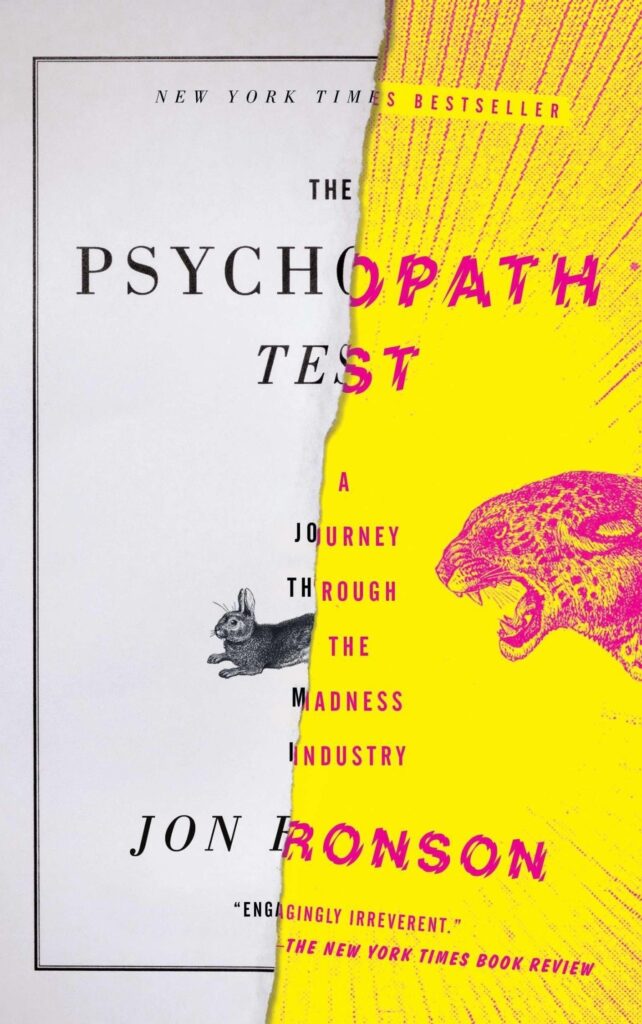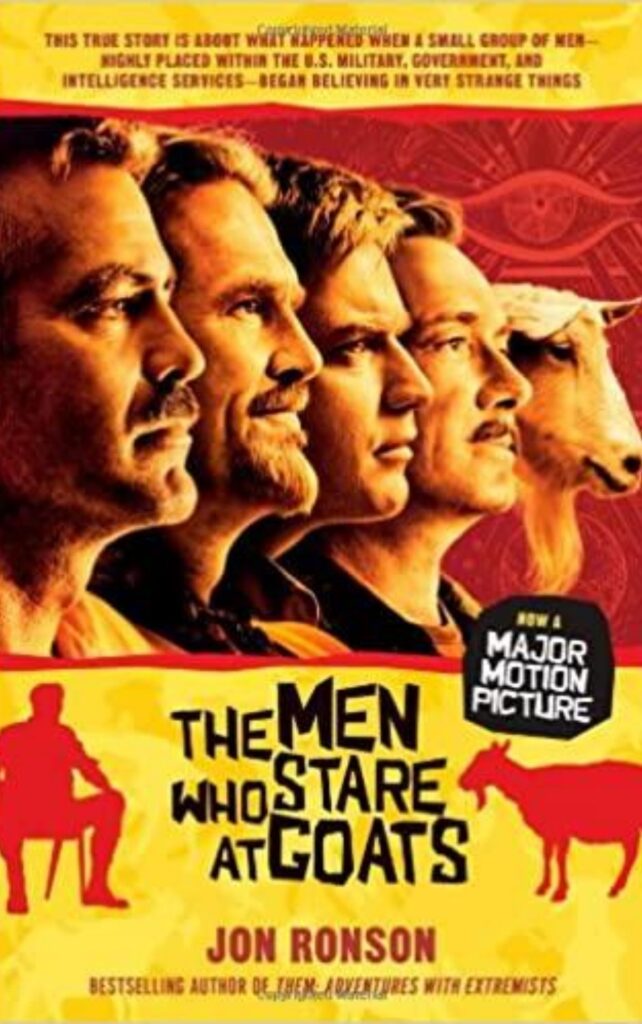“On Background” is a series of blog posts wherein I talk about the books, films, and other media that would come to inform me in writing WE TAKE CARE OF OUR OWN. My gratitude to the authors, journalists, filmmakers, and thinkers responsible for these works is assumed.
Like many of the books that helped me in my research for We Take Care of Our Own, it’s been years since I finished Jon Ronson’s The Psychopath Test (2011) and The Men Who Stare At Goats (2004). For this reason, I don’t remember very much about them, aside from my enjoyment of them not just as a reader but as a writer trying to work with similar subject matter.
It turns out I dogeared certain pages in both books, so I think it might be interesting to reread these pages and see if I can’t figure out what I thought was so important at the time.

The only page in The Psychopath Test that I dogeared is page 97, which contains Dr. Bob Hare’s PCL-R Checklist, a list of personality traits and observable behaviors that’s been used to assess cases of psychopathy over the past forty-plus years. Since I’ve just linked to a Psychology Today blog post that contains the entire checklist I won’t type out the whole thing here, but, if you don’t want to click the link, just know that Hare PCL-R Checklist contains items like “lack of remorse or guilt” (Item 6), “parasitic lifestyle” (Item 9), and “failure to accept responsibility for own actions” (Item 16).
I included the Hare PCL-R Checklist in its entirety as a footnote in my book; one of my psychologist characters has conducted what she calls “a little back-of-the-envelope Hare checklist” while assessing a patient. This starts an argument with another psychologist about the value of her assessment, and so I wanted to ensure the reader was up-to-speed on what everyone was talking about before going any further with that bit of dialogue. The Hare PCL-R Checklist also turned out to be helpful in creating of one of my characters.
As for The Men Who Stare At Goats, many of the pages that I dogeared don’t turn up anything that I can directly point to as helpful for my own work. Still, check out this funny exchange between him and Colonel Jack N. Summe, commander of the Fourth Psychological Operations Airborne, Fort Bragg (page 132):
“Colonel Summe” I said. “What can you tell me about the deployment of Barney and Sesame Street, by PsyOps, inside shipping containers in Al-Qāʾim?”
Colonel Summe didn’t miss a beat.
“I was at the Joint Staff headquarters and I took command of the Fourth PsyOps group on seventeen July, so I have not had the ability to operationally deploy into Iraq and find out what level we’re doing things.” He paused to take a very short breath and continued, “We serve as force providers. When there is a requirement—a crisis requirement—we are tasked to send PsyOpers forward to support. When Psychological Operations deploys…”
Colonel Summe’s words, delivered like machine-gun fire, swam around my head. I smiled and nodded blankly at him.
“… We are always in support of the commander. The senior commander or maneuver commander or area commander is never a PsyOps officer. We are always a support force. So when we attach that PsyOps force to a commander he may identify a use of Psychological Operations loudspeaker capability for that very reason…”
I continued nodding. It was almost as if Colonel Summe wanted to tell me something, but he wanted to say it in such a way that he didn’t want me to understand it. Maybe, I thought, as my mind drifted, and I glanced out the window to the lawn outside his office in the vain hope of spotting injured goats, he was performing some kind of PsyOps on me.

Ronson’s writing makes this exchange, because otherwise this is just a description of a military man spinning a journalist into silent submission, something that happens every day. That must be why I picked up The Men Who Stare At Goats not long after finishing The Psychopath Test—Ronson is so fun to read. Sometimes his writing yields interesting conclusions all on its own. Take my dogeared page 173, which has this nice tidbit about something called Black Budgets:
The amount of money an administration spends on its Black Budget can be seen as a tantalizing barometer of its proclivity toward weirdness. Black Budgets often just fund Black Ops—highly sensitive and deeply shady projects such as assassination squads, and so on, which remain a secret not only to protect Black Operations but to protect Americans, who generally don’t want to think about such things.
I actually have one of the characters in We Take Care of Our Own talk a little bit about Americans’ general reluctance to reflect on the shadiness of some of our Armed Forces’ methods in keeping us safe. (I also mention “black sites” during an exchange between two other characters.) Surely Ronson’s writing informed my decision to do this.
Probably the biggest influence of The Men Who Stare at Goats came via my decision to feature a goat in a particularly bizarre and gruesome chapter of We Take Care of Our Own. Surely Ronson’s interviews with the First Earth Battalion regarding their experiments with goats inspired me (as did, come to think of it, the 2016 documentary Nuts!, about the life and career of John R. Brinkley, who claimed he could cure male impotence by implanting goat testicles into the scrotums of human patients).
There must be something about goats that make them the perfect animal for nefarious experimentation. Is it their stupidity? Their longitudinal pupils? Is it that old representations of Satan often feature goat body parts? Who knows? I’m pretty proud of my goat chapter, though, and I have Jon Ronson to thank for it.